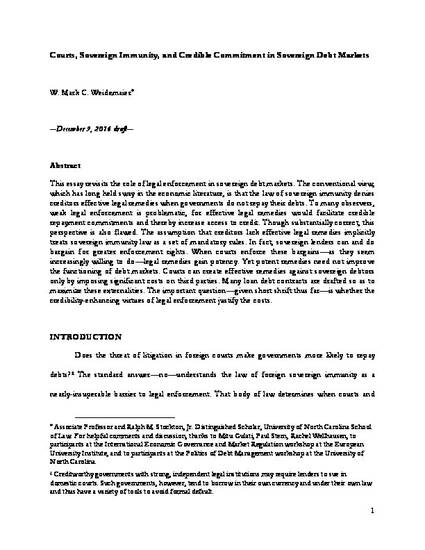
Contribution to Book
Courts, Sovereign Immunity, and Credible Commitment in Sovereign Debt Markets
Oxford Handbook of International Economic Governance
(2017)
Abstract
This essay revisits the role of legal enforcement in sovereign debt markets. The conventional view, which has long held sway in the economic literature, is that the law of sovereign immunity denies creditors effective legal remedies when governments do not repay their debts. To many observers, weak legal enforcement is problematic, for effective legal remedies would facilitate credible repayment commitments and thereby increase access to credit. Though substantially correct, this perspective is also flawed. The assumption that creditors lack effective legal remedies implicitly treats sovereign immunity law as a set of mandatory rules. In fact, sovereign lenders can and do bargain for greater enforcement rights. When courts enforce these bargains—as they seem increasingly willing to do—legal remedies gain potency. Yet potent remedies need not improve the functioning of debt markets. Courts can create effective remedies against sovereign debtors only by imposing significant costs on third parties. Many loan debt contracts are drafted so as to maximize these externalities. The important question—given short shrift thus far—is whether the credibility-enhancing virtues of legal enforcement justify the costs.
Keywords
- sovereign debt,
- sovereign immunity,
- international law
Disciplines
Publication Date
2017
Citation Information
W. Mark C. Weidemaier. "Courts, Sovereign Immunity, and Credible Commitment in Sovereign Debt Markets" Oxford Handbook of International Economic Governance (2017) Available at: http://works.bepress.com/mark_weidemaier/15/
